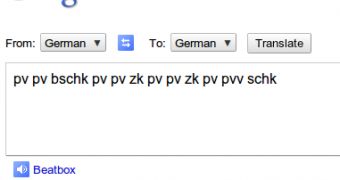Google Translate is a great tool for any number of things, you can quickly understand what a website is about, what you're about eat means, what other people are saying in online conversations and so on. But as with every tool ever created, some people just love getting it to do things it was never intended to.
Singing is probably high on the list of things Google engineers didn't think about when creating Translate and adding new features to it. But the simple voice synthesis tool was too appealing for many no to play around with.
A few months ago, the big trend was Google Translate beatboxing by using certain letter combinations and the German speech synthesis.
Now, full-blown songs, created in Google Translate, have been setting the Taiwanese web, and YouTube, ablaze.
"When we built Google Translate we thought it was a cool tool, but we have to admit we had fairly straightforward ideas about what it would be useful for (lowering language barriers and making more web content available to people around the world). As with many inventions, though, it turns out people have found uses for the tool that we never imagined," Jeff Chin, a Product Manager for Google Translate, wrote.
Using the Chinese voice synthesis, users have been churning out new songs, from simple melodies to fully orchestrated tunes.
Granted, the more elaborate creations make ample use of auto-tune, but if major pop stars don't shy away from the technology, which hides little singing imperfections but can also create the coveted "T-Pain effect," there's no shame in using it if you're a 'robot.'
The phenomenon became so popular that YouTube noted it on its global trends blog. One song in particular ratchet up more than half a million views and was one of the most popular in the country for a period.

 14 DAY TRIAL //
14 DAY TRIAL //